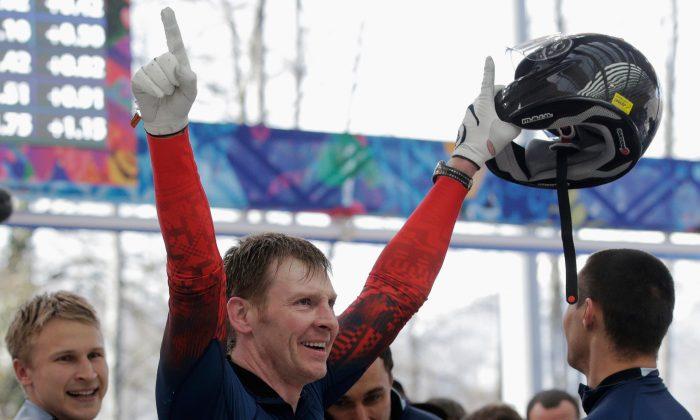Russia is one step away from staying home this Olympic Games.
The World Anti-Doping Agency (WADA) on Monday called for Russia to be banned from all international competitions, including the 2016 Rio Olympics and Paralympics.
WADA made the recommendation to the International Olympic Committee after receiving the 103-page McLaren report, which confirmed state-sponsored doping in Russia.
“In the face of such evidence of state sponsored subversion of anti-doping processes, WADA insists upon imposition of the most serious consequences to protect clean athletes from the scourge of doping in sport,” said WADA President Craig Reedie in a statement.
The agency also recommends that Russian government officials be denied access to international competitions, including the Olympics.
In response to the report, the IOC said on Monday it would not hesitate to use the “toughest sanctions available” against Russia, according to a statement by IOC chief Thomas Bach. “The findings of the report show a shocking and unprecedented attack on the integrity of sport and on the Olympic Games.”
The findings come after the director of Russia’s anti-doping lab, Grigory Rodchenkov, said dozens of Russian athletes used a cocktail of drugs to win gold medals at the 2014 Winter Olympics in Sochi, reported The New York Times on May 12.
Rodchenkov said at least 15 medal winners were part of a state-sponsored doping program that had been planned for years to make sure the nation dominated the games.
The plan worked. Russia topped the medal table with 13 gold, 11 silver, and 9 bronze for a total of 33 medals. Norway, Canada, and the United States came in second, third, and fourth respectively.
WADA appointed Canadian law professor Richard H. McLaren to investigate the matter. The 57-day investigation included numerous witness interviews and the review of thousands of documents, and conducting cyber and forensic analysis of hard drives, urine sample collection bottles, and laboratory analysis of individual athlete samples.
Report Findings
The McLaren report said Rodchenkov “has been truthful” in his allegations.
The Moscow lab operated to protect doped Russian athletes, the report says, by using a system called the Disappearing Positive Methodology.
“The Disappearing Positive Methodology was used as a state-directed method following the very abysmal medal count by the Russian Olympic athletes participating in the 2010 Winter Olympic Games in Vancouver. By that time, Sochi was already been designated as the next Winter Olympics venue,” the report says.
Russian Deputy Minister of Sport Yuri Nagorny, who was appointed in 2010, was critical to the smooth running of the Disappearing Positive Methodology, the investigation found. He was alerted of every positive analytical finding in the Moscow laboratory from 2011 onwards.
The orders would come back from Nagorny as either “SAVE” or “QUARANTINE.” If the order was a SAVE the lab was required to report the sample negative in WADA’s Anti-Doping Management System. Russian lab personnel would falsify the screen result in the Laboratory Information Management System to show a negative lab result.
“The athlete benefited from the cover up determined and directed by the Deputy Minister of Sport and could continue to compete dirty,” says the report.
Between 2012 to 2015, the Disappearing Positive Methodology was used on 643 positive samples, the investigation found. Russian athletes from the vast majority of summer and winter Olympic sports benefited from the system.
‘The Cocktail’
Rodchenkov said he created a three-drug cocktail of illegal steroid substances—metenolone, trenbolone, and oxandrolone—that he mixed with liquor and gave to dozens of Russian competitors.
During the 2012 London Olympics many of Russia’s top athletes were using the cocktails, Rodchenkov said. The cocktails were distributed to various sport federations by Irina Rodionova, the deputy director of the Center of Sports Preparation of National Teams of Russia (CSP).
Switching Samples
The Sochi lab operated a unique sample swapping method to avoid Russian athletes from being caught doping during the Olympics, the investigation found.
The McLaren report says the Russian Ministry of Sport directed, controlled, and oversaw the manipulation of athlete’s analytical results or sample swapping, with the help of the Russian Federal Security Service, CSP, and both Moscow and Sochi labs.
Sample bottles stored in the Moscow laboratory from Sept. 10 to Dec. 10, 2014, were tampered with by having their urine switched with clean urine. DNA analysis also confirmed three samples where the DNA did not match that of the athlete, the report says.
The investigation found a system for doping athletes directed by senior coaching officials of Russian athletics, and supported by the doping control officers working under the direction of the Russian Anti-Doping Agency.
“The coaches were also able to achieve their objectives of doping athletes under their direction by knowing the wash out periods of various performance enhancing drugs,” says the report.
The full McLaren report can be found here.
Russia Medals at the 2012 London Olympics
Russia claimed fourth spot on the medal table behind the United States, China, and Great Britain at the 2012 Olympics.
Russia won 22 Gold, 25 Silver, and 32 Bronze for a total of 79 medals.





Friends Read Free